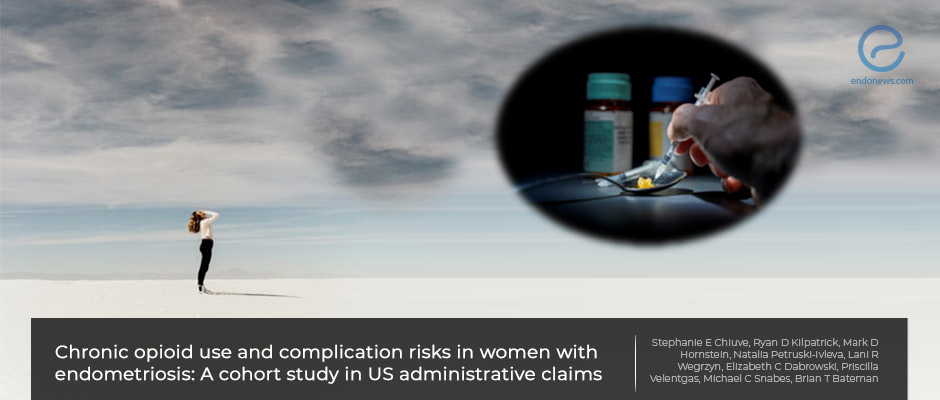Chronic Opioid Use in Women with Endometriosis
Apr 23, 2021
Women with endometriosis who are prescribed opioids should be closely monitored.
Key Points
Highlights:
- Women with endometriosis are at a higher risk of chronic opioid use, dependency, and opioid overdose compared to women without the disease.
Importance:
- This finding should be taken into account when prescribing opioids to women with endometriosis for pain relief.
What's done here:
- Researchers conducted a cohort study to estimate the risk of chronic opioid use in women with endometriosis and to evaluate the patient characteristics associated with chronic opioid use.
Key results:
- Women with endometriosis were at a four-time greater risk of chronic opioid use compared to women without endometriosis.
- Women with endometriosis were at greater risk of opioid dependence and overdose.
- One third of chronic opioid users developed constipation, 20% experienced falls, and 8% reported dizziness.
- Women with endometriosis who were younger, had other pain-causing diseases and had anxiety and depression, were at a higher risk of developing chronic opioid use.
Limitations:
- The findings derive from women who were commercially insured and may not be valid for other groups of women.
- The time period for which women with endometriosis have had the disease has not been taken into account.
- Opioid use was ascertained based on prescription fills and not opioids that women actually took.
Lay Summary
Women with endometriosis are at a higher risk of chronic opioid use compared to those without the disease, according to a new study by researchers in the U.S. This could be due to other diseases that accompany endometriosis.
This finding is important because it could guide clinicians in their choice of pain-relief medication they prescribe patients with endometriosis.
In order to evaluate the factors associated with a higher risk of chronic opioid use and the risk of associated complications, the team led by Dr.Brian Bateman conducted a cohort study using the Clinformatics DataMart database. The researchers compared the risk of chronic opioid use, opioid dependence, and opioid overdose between 2006 and 2017 in 36,373 women with endometriosis and more than two million women without the disease, ages 18 to 50. In this study, the chronic opioid use was defined as 120 or more days' supply of opioids dispensed or 10 or more fills of an opioid during a year.
The authors found that women with endometriosis had a four times greater risk of chronic opioid use compared to women without. Women with endometriosis were also at a higher risk of opioid dependence and opioid overdose. Chronic opioid users increased the dose of opioids and the number of days they used them, with time. They were also using more of other medications such as tranquilizers (benzodiazepines) and sedatives. Furthermore, chronic opioid use was associated with side effects such as constipation, falls, and dizziness. The results also showed that women with endometriosis who were younger, had other conditions associated with pain, and those with anxiety and depression were at a higher risk of being chronic opioid users.
“Women with endometriosis are more likely to become chronic opioid users and experience harmful opioid‐related complications compared to women without endometriosis,” the researchers wrote and underscored the importance of close monitoring of women with endometriosis who are prescribed opioids.
Opioids are increasingly being prescribed in the U.S. potentially leading to opioid‐related deaths. The incidence of opioid use disorders among women is on the rise with women with endometriosis having a higher prevalence of known risk factors for chronic opioid use. Chronic opioid use and dependence is a risk factor for heroin initiation.
Research Source: https://pubmed.ncbi.nlm.nih.gov/33611812/
Chronic opioid use opioid dependency opioid abuse chronic pain

